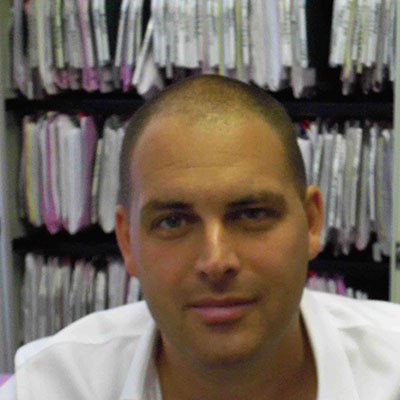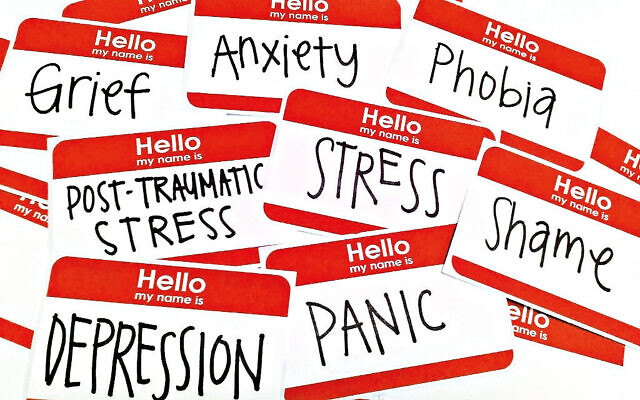OPINION: The entire global Jewish diaspora is undergoing a collective grieving process
'The huge uptick in our community’s anxiety, sadness and fear is rife. You are not alone', writes Dr Mark Silvert
In the early stages of my adolescence, at the age of fifteen, I went on tour to Israel with FZY, a journey that would indelibly etch itself in my memory. We engaged in volunteer work in the Israeli village of Shlomi, nestled along the volatile border between Israel and Lebanon.
This picturesque yet precarious setting exposed us to the ever-present spectre of conflict that loomed over the region, forcing us to seek refuge one night in the protective confines of a shelter within a youth hostel, courtesy of the menacing mortar fire unleashed by Hezbollah.
This was likely my most palpable initial experience of being singled out specifically for my Jewish identity in Israel or as a Jew, period.
Some twenty years later in 2014, my presence coincided with the tumultuous “Operation Protective Edge” during a visit to Tel-Aviv. The city, typically vibrant and lively, was suddenly thrust into a state of unease as it endured an incessant deluge of thousands of rockets fired by Hamas. The stark juxtaposition of familial warmth in Jaffa and the dissonant symphony of wailing sirens and jarring air raid warnings provided a reminder that conflict could erupt at the most unexpected juncture.
So, I would venture that it is quite something in present times after Israel has just been through the worst pogrom since the formation of the state of Israel, to receive voice notes from my cousins who reside in Israel. Their voices laced with concern and foreboding. They implore, “Mark, please stay safe. We are closely monitoring the marches and the distressing sight of people tearing down posters of our kidnapped children on the streets of London. Please avoid the cenotaph this weekend!” They are worried about us? In London?
Innocently, I had once believed that the modern Jewish Diaspora, including my friends and family in the United Kingdom, were somewhat insulated from the pervasive anxieties that had long haunted the state of Israel. Nonetheless, the recent developments occurring in the UK have violently disrupted our feeling of security and, perhaps, exposed years of naive complacency.

The Jewish community in Britain has borne the brunt of the most distressing wave of hate incidents in recent memory, with over a thousand such incidents recorded in the wake of the grievous Hamas actions. Community Security Trust (CST) reported the highest 28-day total since its inception in 1984. These are far from ordinary times.
The disquieting reality of noxious contemporary antisemitism has infiltrated all aspects of our lives, including traditional media, online platforms, and even within the realm of academic discourse.
As we tune into the radio, television, or participate in online discussions through social media, Jews are bombarded by a multitude of commentators who use the terms “genocide” and “ethnic cleansing” regarding Israel’s actions against a radical extremist group supported by Iranian Mullahs. Their aims are not only to threaten the Jewish population but also call openly and repeatedly for their intention to eliminate us in the Western world.
To use words that remind us of the Shoah, drenched in vitriol and malice against us, invoke a profound sense of revulsion and inflict wounds that run deep within our collective psyche.
As we grapple with the psychological aftermath of the terror we are still reeling from since the pogrom on 7th October, and then the subsequent relentless barrage of hate on our streets, my Jewish patients have reported a litany of symptoms and afflictions.
Many describe their struggles with insomnia, the inability to focus on daily tasks with a pervasive sense of weariness that casts a long shadow over their professional and personal lives.

In response to this growing crisis, numerous companies and educational institutions have sought to educate their staff and students about antisemitism, often resorting to the introduction of external speakers to address the issue. Suggestions for deep breathing techniques are met with dismissive eye rolls and a sense of patronising hopelessness. “This goes beyond just controlling your breathing!” one person recently told me. “Do they not see what is happening?”
Jewish shops smashed, mezuzahs ripped off doors, antisemitic graffiti laid on bridges, up to half a million people marching through London streets chanting “Jihad” and “From the River to the Sea” with impunity.
What comes next, a Kristallnacht this Saturday night? Jews have historically been a highly sensitive and apprehensive community. Anxiety is gripping many of us.
Patients afflicted by these trying times find themselves ensnared in a seemingly inescapable web of learned helplessness. They lament that a single misstep, like inadvertently mis-gendering a colleague, could lead to dismissal, whereas colleagues openly endorsing anti-Israel sentiments often evade censure, rationalising their actions as political expressions immune to reproach, when we see it for exactly what it is.
Emotional support is indispensable, seeking medical assistance can also prove beneficial in the face of persistent intrusive thoughts, chronic anxiety, persistent low mood, and substantial disruptions in sleep and dietary patterns. It is important not to feel isolated or alone, I can confirm the huge uptick in our community’s anxiety and feelings of sadness and fear is rife. You are not alone.
Following the receipt of support, one might consider taking an active role in a movement or organisation dedicated to combating hate. Involvement in activism not only psychologically empowers individuals but also offers a glimmer of hope for a more tolerant and inclusive future. It also facilitates connections with like-minded individuals who share a commitment to combating the scourge of antisemitism.
Nonetheless, it is imperative to remember that the battle against widespread antisemitism is not our sole burden to bear. Even when it feels like a David versus Goliath ordeal, our personal well-being should always remain a priority.
It is crucial to be mindful of the content we consume on social media platforms. Exposure to prejudiced beliefs and actions can erode one’s mental well-being, potentially leading to the internalisation of negative perspectives. In this digital age, taking control of your online environment by blocking or muting accounts that compromise your psychological well-being can shield you from the corrosive influence of certain harmful content.
In the face of these relentless challenges, it is my belief that British Jewry, and indeed the entire global Jewish community, is undergoing a collective grieving process. We find ourselves traversing the five stages of grief as described by the eminent psychiatrist Elisabeth Kubler Ross.
Over the past month, we have grappled with at first denial of what we were witnessing, one Israeli relative described the feeling I think shared by many that this feels like a nightmare that we wish we could turn the clock back to October 6th.
Our understandable initial desire to refuse to accept the grim reality of what has just happened to our people; anger, as we grapple with the barbarism we bore witness to; bargaining, where we seek to find solutions in the face of this distressing reality; depression, the weight of the overwhelming sadness we bear; and finally, acceptance, the acknowledgment that we must continue our collective struggle against antisemitism.
Nevertheless, as Jews, we shall never accept the hatred directed at us, nor compromise our values and beliefs. This was Hamas’s declared intention: to turn world opinion against us.
The words ‘Never again’ resonate with profound significance, now more than ever, serving as a poignant reminder or our commitment to the prevention of future atrocities and a steadfast determination to combat hatred in all its forms.
- Dr Mark Silvert, Consultant Psychiatrist and Medical Director, trained at Harvard, and St Bartholomew’s and the Royal London Hospitals. He is director of The Blue Tree Clinic London.

Thank you for helping to make Jewish News the leading source of news and opinion for the UK Jewish community. Today we're asking for your invaluable help to continue putting our community first in everything we do.
For as little as £5 a month you can help sustain the vital work we do in celebrating and standing up for Jewish life in Britain.
Jewish News holds our community together and keeps us connected. Like a synagogue, it’s where people turn to feel part of something bigger. It also proudly shows the rest of Britain the vibrancy and rich culture of modern Jewish life.
You can make a quick and easy one-off or monthly contribution of £5, £10, £20 or any other sum you’re comfortable with.
100% of your donation will help us continue celebrating our community, in all its dynamic diversity...
Engaging
Being a community platform means so much more than producing a newspaper and website. One of our proudest roles is media partnering with our invaluable charities to amplify the outstanding work they do to help us all.
Celebrating
There’s no shortage of oys in the world but Jewish News takes every opportunity to celebrate the joys too, through projects like Night of Heroes, 40 Under 40 and other compelling countdowns that make the community kvell with pride.
Pioneering
In the first collaboration between media outlets from different faiths, Jewish News worked with British Muslim TV and Church Times to produce a list of young activists leading the way on interfaith understanding.
Campaigning
Royal Mail issued a stamp honouring Holocaust hero Sir Nicholas Winton after a Jewish News campaign attracted more than 100,000 backers. Jewish Newsalso produces special editions of the paper highlighting pressing issues including mental health and Holocaust remembrance.
Easy access
In an age when news is readily accessible, Jewish News provides high-quality content free online and offline, removing any financial barriers to connecting people.
Voice of our community to wider society
The Jewish News team regularly appears on TV, radio and on the pages of the national press to comment on stories about the Jewish community. Easy access to the paper on the streets of London also means Jewish News provides an invaluable window into the community for the country at large.
We hope you agree all this is worth preserving.






















